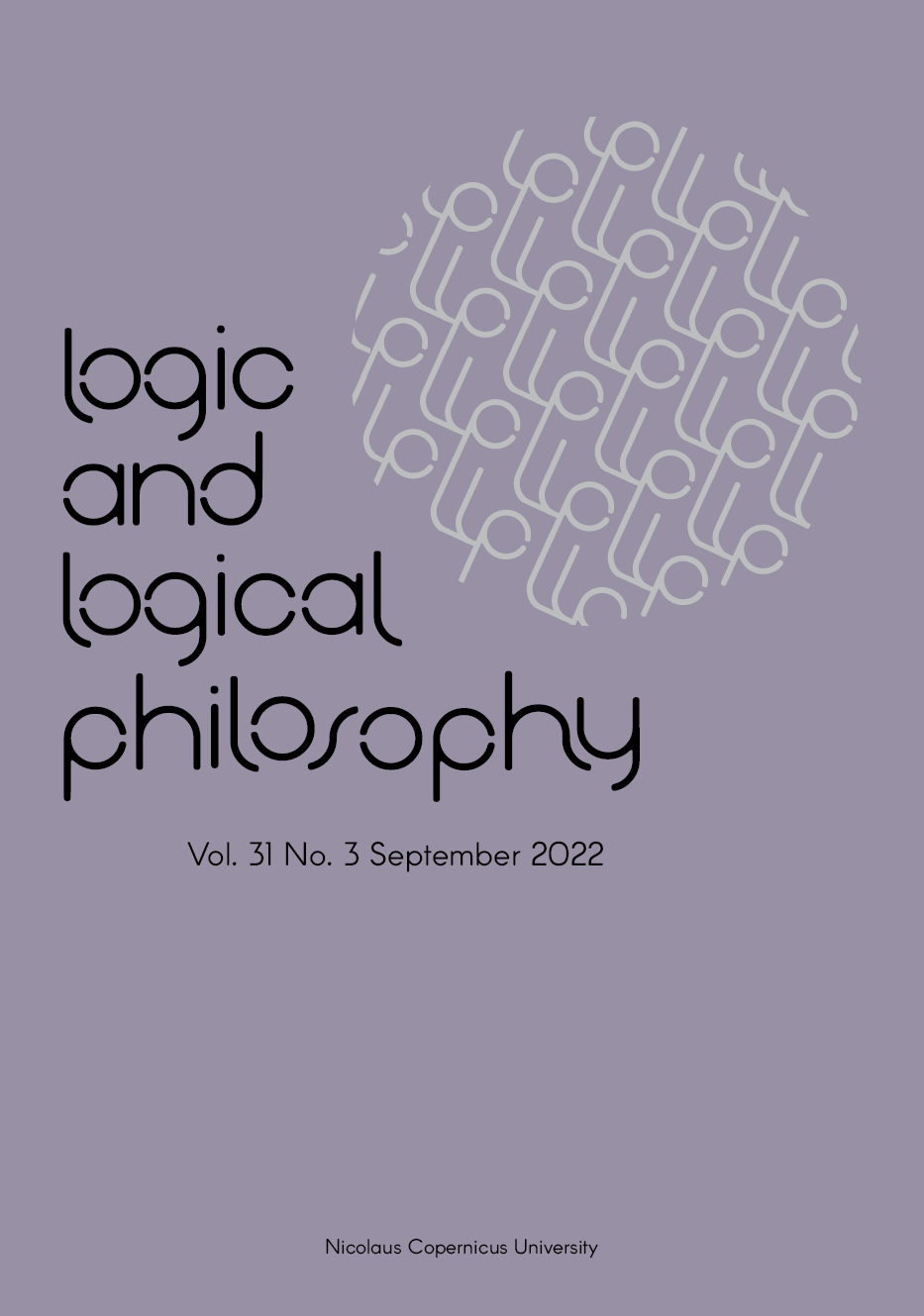Dynamic Probabilistic Entailment. Improving on Adams' Dynamic Entailment Relation
DOI:
https://doi.org/10.12775/LLP.2021.022Keywords
probabilistic entailment, experimental philosophyAbstract
The inferences of contraposition (A ⇒ C ∴ ¬C ⇒ ¬A), the hypothetical syllogism (A ⇒ B, B ⇒ C ∴ A ⇒ C), and others are widely seen as unacceptable for counterfactual conditionals. Adams convincingly argued, however, that these inferences are unacceptable for indicative conditionals as well. He argued that an indicative conditional of form A ⇒ C has assertability conditions instead of truth conditions, and that their assertability ‘goes with’ the conditional probability p(C|A). To account for inferences, Adams developed the notion of probabilistic entailment as an extension of classical entailment. This combined approach (correctly) predicts that contraposition and the hypothetical syllogism are invalid inferences. Perhaps less well-known, however, is that the approach also predicts that the unconditional counterparts of these inferences, e.g., modus tollens (A ⇒ C, ¬C ∴ ¬A), and iterated modus ponens (A ⇒ B, B ⇒ C, A ∴ C) are predicted to be valid. We will argue both by example and by calling to the results from a behavioral experiment (N = 159) that these latter predictions are incorrect if the unconditional premises in these inferences are seen as new information. Then we will discuss Adams’ (1998) dynamic probabilistic entailment relation, and argue that it is problematic. Finally, it will be shown how his dynamic entailment relation can be improved such that the incongruence predicted by Adams’ original system concerning conditionals and their unconditional counterparts are overcome. Finally, it will be argued that the idea behind this new notion of entailment is of more general relevance.
References
Adams, E., 1965, “The logic of conditionals”, Inquiry 8: 166–197. DOI: https://doi.org/10.1080/00201746508601430
Adams, E., 1966, “Probability and the logic of conditionals”, pages 265–316 in J. Hintikka and P. Suppes (eds.), Aspects of Inductive Logic, North Holland Publishing Company, Amsterdam. DOI: https://doi.org/10.1016/S0049-237X(08)71673-2
Adams, E., 1975, The Logic of Conditionals. An Application of Probability to Deductive Logic, Reidel, Dordrecht.
Adams, E., 1983, “Probabilistic enthymemes”, Journal of Pragmatics 7: 283–295.
Adams, E., 1998, A Primer of Probability Logic, CSLI Publications, Stanford.
Burgess, J. P., 1981, “Quick completeness proofs for some logics of conditionals”, Notre Dame Journal of Formal Logic 22: 76–84. DOI: https://doi.org/10.1305/nd-jfl/1093883341
Bürkner, P.-C., 2018, “Advanced Bayesian multilevel modeling with the R package brms”, The R. Journal 10 (1): 395–411. DOI: https://doi.org/10.32614/RJ-2018-01
Carnap, R., 1950, Logical Foundations of Probability, Routledge and Kegan Paul, London. DOI: https://doi.org/10.2307/2021419
Carpenter, B., A. Gelman, M. Hoffman, D. Lee, B. Goodrich, B. Betancourt et al., 2017, “Stan: A probabilistic programming language”, Journal of Statistical Software, Articles 76 (1): 1–32. DOI: https://doi.org/10.18637/jss.v076.i01
Cooper, W. S., 1978, Foundations of Logico-Linguistics. A Unified Theory of Information, Language and Logic, Reidel, Dordrecht.
Keynes, J. M., 1921, A Treatise on Probability, Macmillan, London.
Lewis, D., 1973, Counterfactuals, Basic Blackwell, Oxford. DOI: https://doi.org/10.2307/2273738
McElreath, R., 2020, Statistical Rethinking. A Bayesian Course with Examples in R and Stan, CRC Press.
Milne, P., 1997, “Bruno de Finetti and the logic of conditional events”, British Journal of Philosophy of Science, 48: 195–232. DOI: https://doi.org/10.1093/bjps/48.2.195
Oaksford, M., and N. Chater, 2008, “Probability logic and the modus ponens: Modus tollens asymmetry in conditional inference”, pages 97–120 in M. Oaksford and N. Chater (eds.), The Probabilistic Mind. Prospects for Bayesian Cognitive Science, Oxford: Oxford University Press. DOI: https://doi.org/10.1093/acprof:oso/9780199216093.003.0005
Oaksford, M., and N. Chater, 2013, “Dynamic inference and everyday conditional reasoning in the new paradigm”, Thinking & Reasoning 19: 346–379. DOI: https://doi.org/10.1080/13546783.2013.808163
Over, D. E., and N. Cruz, 2018, “Probabilistic accounts of conditional reasoning”, pages 434–450 in L. Ball and V. Thompson (eds.), International Handbook of Thinking and Reasoning, Hove: Psychology Press.
Pearl, J., 1990, “System Z: A natural ordering of defaults with tractable applications to nonmonotonic reasoning”, pages 121–135 in TARK’90: Proceedings of the 3rd conference on Theoretical aspects of reasoning about knowledge.
Stalnaker, R., 1968, “A theory of conditionals”, in N. Rescher (ed.), Studies in Logical Theory, American Philosophical Quarterly Monograph Series, No. 2, Basil Blackwell, Oxford.
Stalnaker, R., 1975, “Indicative conditionals”, Philosophia 5: 269–286. DOI: https://doi.org/10.1007/BF02379021
Vehtari, A., J. Gabry, M. Magnusson, Y. Yao, P. Bürkner, T. Paananen, and A. Gelman, 2020, loo: Efficient Leave-One-Out Cross-Validation and WAIC for Bayesian Models. DOI: https://doi.org/10.1007/s11222-016-9696-4
Vehtari, A., A. Gelman, and J. Gabry, 2017, “Practical Bayesian model evaluation using leave-one-out cross-validation and WAIC”, Statistics and Computing 27 (5): 1413–1432. DOI: https://doi.org/10.1007/s11222-016-9696-4
Vehtari, A., A. Gelman, D. Simpson, B. Carpenter, and P.-C. Bürkner, 2020, “Rank-normalization, folding, and localization: An improved R for assessing convergence of MCMC”, Bayesian Analysis. DOI: https://doi.org/10.1214/20-BA1221
Downloads
Published
How to Cite
Issue
Section
License
Copyright (c) 2021 Logic and Logical Philosophy

This work is licensed under a Creative Commons Attribution-NoDerivatives 4.0 International License.
Stats
Number of views and downloads: 1860
Number of citations: 0







